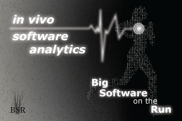3TU.BSR: Competences and Collaboration
Within 3TU.BSR we join the following six competences:
- Process Mining (Van der Aalst, Van Dongen, Fahland). The AIS group is well known for its research in process analytics. Traditionally there is a gap between model-based analysis and more data-driven approaches (data mining, machine learning, business intelligence and evolutionary algorithms). Process mining techniques aim to bridge this gap. The expertise of AIS in process model discovery, conformance checking, data-driven model repair and extension, bottleneck analysis, and prediction is used to analyze software based on the events recorded.
- Visual Analytics (Van Wijk, Van de Wetering, Westenberg). The VIS group has a strong track record in information visualization and visual analytics, especially for applications in software engineering. The expertise on the development of novel methods, techniques, and systems for interactive visualization and analysis is used to enable experts to find patterns, trends, and form hypotheses about huge streams of event data.
- Software Engineering (Van Deursen, Zaidman, Bacchelli). The SERG has a strong reputation for its research in software testing, software architecture, repository mining, collaborative software development, and the use of dynamic analysis for the purpose of system understanding. This software engineering expertise is of crucial importance for the analysis of running software based on data.
- Privacy and Security (Lagendijk, Erkin, van der Lubbe). The CY group concentrates its research on the intersecting field of big data and privacy enhancing technologies. Solutions developed for preserving privacy of data by anonymizing methods and in particular by processing data under encryption, will be used for finding patterns, trends, and analysis of sensitive data obtained from running software. A new challenge in BSR is the use of privacy enhancing techniques in on-line assimilating and conformance testing using event data and quantitative software models.
- Verification and Validation (Van de Pol, Stoelinga, Langerak, Katoen). The FMT group combines a unique expertise in scalable model checking algorithms (van de Pol, Katoen), quantitative modeling and evaluation (Katoen, Stoelinga, Langerak), and model based testing (Stoelinga, vd Pol). We will explore the scope of model based testing and redesign its algorithms for online conformance checking of big software in Track 2. Scalable model checking algorithms that combine multi-core and symbolic techniques, will be developed to predict the behavior of runtime systems in Track 3.
- Concurrent Software (Huisman, Rensink, Aksit). Marieke Huisman (winner of the Dutch ICT award 2013) and her team have a strong track record on analysis of concurrent software. In her ERC project VerCors, she developed tools for static analysis of concurrent programs, using different concurrency paradigms (shared memory, but also vector programs). Within BSR, these analysis techniques will be extended to a dynamic setting, to obtain quick feedback, prevent serious problems, and to create structured data to facilitate data mining. To move towards this dynamic setting, ingredients from runtime monitoring (Aksit) and software transformation (Rensink) will be incorporated.


